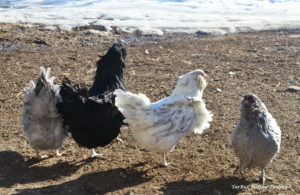In the winter months, as the weather turns colder, chicken keepers are forced to keep their birds shut indoors to protect them from adverse weather conditions. Confinement indoors can create conditions, triggering respiratory illness in poultry.
The respiratory systems of chickens are very sensitive to dust and ammonia, too much of either can bring on symptoms of sneezing, gasping for air, wheezy gurgling sounds, drainage from nostrils, with ruffled feather appearance. This illness can be problematic, and it is wise to be proactive and take these preventative measures.
Preventing Respiratory Illness 
- Start by ensuring your chicken house has good ventilation, consider installing ceiling or wall vents, if applicable install a box fan to keep the air circulating.
- Keep your building draft-free, covering holes and closing windows at night when the temperatures drop below freezing.
- Strive to keep their living area dry and clean, avoiding the excessive buildup of manure and wetness, that produces ammonia, particularly on warmer days.
- Use agricultural lime, when you clean the coop, put down a thin layer and top with your normal bedding. The lime will help keep the floor dry and reduce odors.
- When the weather permits, open doors and or windows to air out the building
- Let chickens outdoors, for fresh air and exercise on warmer days.
- Use bedding that has minimum dust or put down when chickens are not in the area.
- For a quick fix, top existing bedding with fresh bedding and rake in agricultural lime. This can be done, as long as the existing bedding is not over soiled, this will reduce the number of times you have to thoroughly clean.

What is Agricultural Lime
Agricultural lime is ground limestone known as calcium carbonate and is safe for chickens, animals, and the environment. It is commonly used in coops and barns to destroy odors. Agricultural lime stops the growth of pathogens with its high pH level and deters insects. It works by producing calcium ions that destroy odors created by biological waste, ammonia. It is important to note, that there are two types of lime “Agricultural Lime” and the other is “Hydrated Lime” which is used for masonry work and is not safe for poultry and animals. Agricultural lime also known as barn lime can be purchased at most farm stores, inexpensively, around $3.50 per 50-pound bag.

Keeping their Immune Systems Strong during winter
In the winter chickens aren’t able to consume the nice green weeds and bugs of summer, that naturally keep them healthier. As always it is important to feed a complete feed designed for chickens, but consider boosting their immune system, with probiotics, vitamins, and electrolytes. In addition, there are other tonics that show promising immune health benefits like apple cider vinegar and essential oils. Adding apple cider vinegar to their diet is known to reduce pH levels in the crop which assists in the prevention of growth of harmful bacteria. Oregano and thyme are natural antibiotic alternatives. In addition, oregano is antiparasitic and encourages water and feed consumption. Currently, there are commercial poultry farms using essential oils to support poultry health. “Nothing used as substitute worked as well as oregano oil products”, at Bell & Evans they have long been free of antibiotics”, for more information see “In Hopes of Healthier Chickens, Farms Turn to Oregano”, The New York Times, Stephanie Strom Dec 25, 2012. “Thyme oil shows potential for improvement of intestinal barrier integrity, antioxidant status as well as evoking an immune response in chickens”.* All of these supplements can easily be administered to your poultry through their drinking water.
Keep your Flock Healthy
It is common knowledge that a healthy chicken is a lot easier to care for than a sick one, chickens are resilient to a variety of conditions, but once they are ill, it can be a real challenge to get them healthy again. Following these preventative steps to avoid respiratory illness, strive to keep their living area dry, feed them a good quality feed and supplements to boost their immune system, and take action if you smell ammonia if you can smell it, so can your chickens.
To hear more from Valerie Boese on cooking, keeping chickens, and gardening ideas follow these links:
Slice of Taste Pinterest FaceBook Grit Twitter Tarbox Hollow Poultry













4 Comments
Thank you for sharing
I am trying to locate some information on how to treat my chicken run after having sick chickens. They were taken to a poultry vet and she said that it was some sort of respiratory infectiom. What with all the information I have come across it only covers information on how to treat the hens and not the surrounding area??? Help
It was nice that you said that agricultural lime is known to be packed with calcium carbonate. As you said, they are safe for chickens, animals, and the environment. This is something that I will share with my father so he could consider finding a supplier of agricultural lime. He has decided to care for crops and have livestock on his farm since he will retire from his job next month. He will surely consider your tips as he wants to keep the soil in his garden as beneficial as possible.
Love Ms. Boese’s article on 8 WAYS TO REDUCE RESPIRATORY ILLNESS IN POULTRY. Keeping chickens healthy in an enclosed space is not an easy task–no matter what climate you live in. The suggestion of using calcium carbonate in coops has been quite effective in my humid, wet, muggy town of Birmingham, AL!